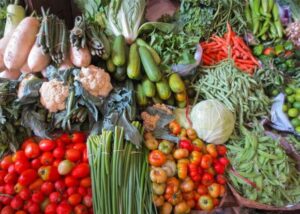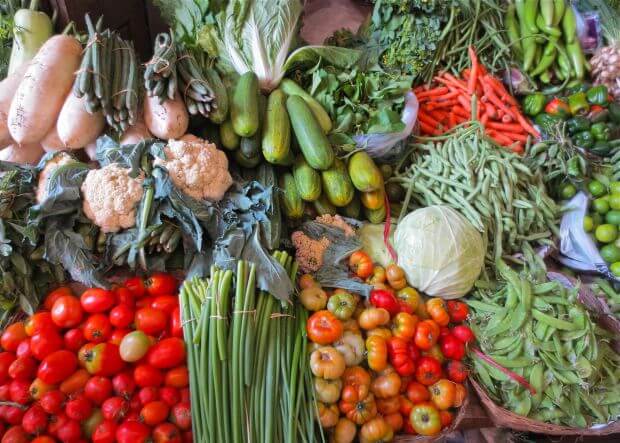Vitamins and minerals are essential nutrients that our bodies need in varying amounts in order to function properly.
Most people should be able to get all their nutrient needs through a sensible balanced diet. Some people choose to take supplements even though they do not need to and should be aware that taking these for too long can cause side effects. However, some people may need to take supplements, as advised by their doctor, such as in the case where folic acid supplements are recommended for pregnant women.
This article will discuss vitamins and minerals alongside their functions, advantages and the daily required amounts that are needed to live a healthy and happy life.
Vitamins can be divided into two groups:-
- Water-soluble – vitamins C and B
- Fat-soluble – vitamins A,D, E and K
1) Water-soluble vitamins are consumed from certain foods, transported around the body in water and any excess amounts of vitamins C and B are then excreted in the urine. We therefore need to constantly replenish these vitamins regularly.
Water-soluble vitamins are found in foods such as fruit, vegetables and grains.
2) Fat-soluble vitamins are stored in the liver and fatty tissues for future use. Because excess stores of these can build up, there is no need to eat extra amounts of foods containing vitamins A, D, E and K as consuming more is required can be harmful.
Fat-soluble vitamins are found mainly in fatty foods such as animal fats for example butter and lard. These vitamins are also found in vegetable oils, dairy foods and oily fish and liver.
List of Vitamins and there important functions and recommended daily amounts in the U.K.
Vitamin A also known as retinol:-
- Helps maintain good vision, healthy skin and hair.
- Healthy bone and tooth development rely up it.
- Provides Immunity against infections.
- Recommended 0.7mg a day for men.
- Recommended 0.6mg a day for women.
If there is a shortage of vitamin A, then Betacarotene will be used by the body as a substitute. It can be found in sweet potatoes, carrots, spinach and other dark green leafy vegetables.
Vitamin B1 also known as Thiamine:-
- Aids the conversion of food into energy.
- Keeps nerves and muscle tissue healthy.
- Recommended 1.0mg a day for men.
- Recommended 0.8mg a day for women.
Vitamin B2 also known as Riboflavin:-
- Aids growth and reproduction.
- Helps metabolise fats, carbohydrates and proteins.
- Promotes healthy skins.
- Recommended 1.3mg a day for men.
- Recommended 1.1mg a day for women.
Vitamin B3 also known as Niacin:-
- Helps produce energy from the foods we eat.
- Helps to keep the nervous and digestive systems healthy.
- Recommended 17mg a day for men.
- Recommended 13mg a day for women.
Vitamin B5 also known as Pantothenic Acid:-
- Maintenance of growth and development of the central nervous system.
- Helps in cell building and repair.
- Recommended 200mg a day for both men and women.
Vitamin B6 also known as Pyridoxine:-
- Helps in the utilisation of proteins and the metabolism of fats.
- Necessary for the production of red blood cells and antibodies.
- Recommended 1.4mg a day for men.
- Recommended 1.2mg a day for women.
Folic Acid also known as folate is one of the B-group vitamins:-
- Helps to form red blood cells and genetic material.
- Acts as an antioxidant.
- Helps reduce the risk of spina bifida in unborn babies.
- Recommended 0.2mg a day for both men and women.
Vitamin B12 also known as Cyanocobalamin:-
- Makes red blood cells and keeps the nervous system healthy.
- Releases energy from the food we eat.
- Processes folic acid.
- Recommended 0.0015mg a day for both men and women.
Vitamin C also known as Ascorbic Acid:-
- Strengthens tissue and aids healing.
- Fights infection.
- Regulates cholesterol, and production of red blood cells.
- Recommended 40mg a day for both men and women.
Vitamin D also known as Calciferol:-
- Helps to regulate the amount of calcium and phosphate in the body which are needed to keep bones and teeth healthy.
- Recommended 0.01mg a day for both men and women or plenty of sunlight.
Vitamin E also known as Tocopherol:-
- Prevents cell-membrane damage.
- Recommended 4mg a day for men.
- Recommended 3mg a day for women.
Vitamin K also known as Phylloquinone:-
- Needed for blood clotting so that wounds heal properly.
- Increasing evidence shows vitamin K is also needed to help build strong bones.
- Adults need approximately 0.001mg a day of vitamin K per Kg of body weight.
Minerals can be divided into two groups:-
- Macro Elements – which are required in larger quantities e.g. half a teaspoon.
- Trace Elements – which are required in minute quantities invisible to the naked eye.
Sodium is an important macro element. It is responsible for fluid regulation in the body. An excess increase in salt in the body can cause osmosis or the drawing of water from the cells into the blood to try and achieve a balance between sodium in cells and the blood stream. This can result in a rise in blood pressure, therefore it is recommended to reduce salt intake.
- The recommended daily amount of sodium for adults in the U.K. is 1.6g per day.
Calcium is another very important macro element. There is more calcium in the body than any other mineral and it is important for many body functions such as strong healthy bones. Recently due to the heightened awareness of fat content in foods, in particular dairy products, many people have stopped eating these products and are compromising their intake of calcium. Whilst it can be obtained from vegetarian sources such as leafy green vegetables, it is mainly found in dairy products.
What many people do not realise is that just switching from full fat milk to semi-skimmed milk would still mean that they were getting roughly the same amount of calcium as they would from whole milk and reducing their fat intake too!
- The recommended daily amount of calcium for adults in the U.K. is 700mg per day.
Iron is a trace element:-
- Iron makes red blood cells and carries oxygen around the body.
- Recommended 8.7mg a day for men.
- Recommended 14.8mg a day for women.
Potassium is a trace element:-
- Potassium, together with sodium helps regulate fluid within cells.
- Potassium is also associated with helping to lower blood pressure.
- Adults need approximately 3500mg potassium a day.
Phosphorus is a trace element:-
- Helps build strong bones and teeth and helps to release energy from food.
- Adults need 550mg of phosphorus a day.
Copper is a trace element:-
- Helps produce red and white blood cells and triggers the release of iron.
- Is important with infant growth, brain development, the immune system and strong bones.
- Adults need 1.2mg of copper a day.
Magnesium is a trace element:-
- Helps regulate body temperature and the production of protein.
- Lowers blood pressure and also aids nerve and muscle function.
- Recommended 300mg a day for men.
- Recommended 270mg a day for women.
Beta-Carotene is a trace element:-
- It is turned into vitamin A and performs the same functions in the body as vitamin A.
- As with vitamin A, you should be able to get the amount of this trace element from a good daily diet of yellow and green fruit and vegetables such as spinach, carrots and apricots.
Boron is a trace element:-
- Helps the body make use of glucose, fats, oestrogen and other minerals, such as calcium, copper and magnesium in the food we eat.
- Again you should be able to get the daily amount needed from a good diet by eating green vegetables, fruit and nuts.
Chromium is a trace element:-
- Thought to influence how the hormone insulin behaves in the body and may affect the amount of energy we get from food.
- Adults need at least 0.025mg of chromium a day.
Cobalt is a trace element:-
- Forms part of the structure of vitamin B12, one of the B Vitamins discussed earlier.
- As it forms part of vitamin B12, as long as you get enough of this vitamin no more is needed.
Manganese is a trace element:-
- Helps to make and to activate some of the enzymes in the body.
- You should be able to get the amount required from a good daily diet.
- Good sources of manganese include tea!
Molybdenum is a trace element:-
- Helps to make and activate some of the enzymes that repair and make genetic material.
- You should be able to get the amount required from a good daily diet.
- Good sources of molybdenum include nuts, tinned vegetables and cereals like oats.
Nickel is a trace element:-
- Nickel influences the amount of iron that our bodies absorb from foods.
- It is associated with being important in the making of red blood cells.
- You should be able to get the amount required from a good daily diet.
- Good sources of nickel include lentils, oats and nuts.
Selenium is a trace element:-
- Plays an important role in our immune systems function and in reproduction.
- Helps prevent damage to cells and tissues.
- Recommended 0.075mg a day for men.
- Recommended 0.06mg a day for women.
Silicon is a trace element:-
- Silicon is a mineral that helps to keep bones and connective tissues healthy.
- You should be able to get the amount required from a good daily diet.
- Silicon is found is grains and fruit and vegetables.
Sulphur is a trace element:-
- Involved in many different body processes.
- Helps to make tissues such as cartilage.
- It is found naturally in many different forms in all foods.
Zinc is a trace element:-
- Helps make new cells and enzymes
- Helps to process carbohydrate, fat and protein in food.
- Aids in the healing of wounds.
- Recommended 5.5-9.5mg a day for men.
- Recommended 4-7mg a day for women.
In Summary
Have a varied, healthy diet filled with fruits and vegetables, grains and lower fat dairy products and the use of any supplements, unless prescribed by a doctor, should not be needed.
Next to Eating Out and Food Labelling


